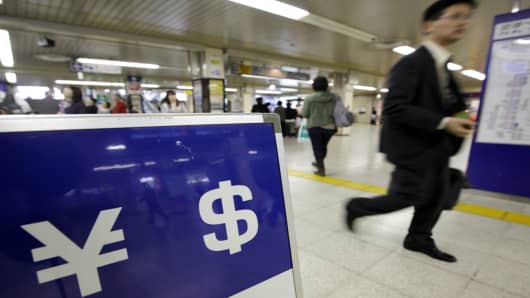Just a few days after global finance ministers' and central bank chiefs' meeting in Moscow dismissed talk of a currency war, it appears that a battle is brewing in Asia to keep the value of currencies competitive.
On Wednesday, South Korea's president-elect Park Geun-Hye said her government would take preemptive and effective steps to ensure stability for the won, saying a sharp fall in the yen has made business tougher for South Korean firms.
The same day, New Zealand's central bank governor Graeme Wheeler said strength in the kiwi dollar was partly the result of global imbalances. Those comments sent the currency falling more than 1 percent.
These are the latest signs of concerns that Asian countries may push down the value of their currencies, despite efforts at the recent meeting of the Group of 20 nations to diffuse talk of a global currency war.
The G-20 agreed to "refrain from competitive devaluation," while the head of the International Monetary Fund Christine Lagarde strongly dismissed concerns over a currency war.
(Read More: Currency War? More Like Currency Worries)
"It's funny that all this (the comments in Asia) comes within days of the G-20," said Nizim Idris, head of strategy for fixed income and currencies at Macquarie in Singapore. "It's like, never mind the G-20, everyone's still talking about currencies."
The yen's sharp weakening in recent months amid expectations of aggressive monetary easing in Japan is at the center of the currency debate since a weak yen gives Japan's exporters a competitive edge in key exports markets over Asian rivals.
The yen is down about 7 percent against the U.S. dollar so far this year. The move in other Asian currencies pales in comparison: the Singapore and Taiwan currencies are down just over 1 percent each versus the greenback, while South Korea's won is down about 1 percent and the Thai baht is up almost 2.5 percent.
Thailand's finance minister sent a letter to the central bank earlier this month, saying interest rates should be cut to help limit capital inflows and limit upward pressure on the baht. Thailand's central bank, however, left monetary policy unchanged at a meeting on Wednesday.
(Read More: South Korea, Thailand Warn of Easy Money Fallout)
What's Coming
According to Robert Rennie, global head of forex strategy at Westpac Bank in Sydney, the weakness in the yen, which he says has depreciated by 20 percent on a trade-weighted basis from the peaks of last year, is having a big impact on Asia.
"The value of the yen is a whole lot weaker than people think," he told CNBC earlier this week. "This (currency) debate is something we are going to see increasingly in coming months, the competitive devaluation of the yen is having a much bigger impact on the rest of Asia than people understand," Rennie added.
The yen is hovering near its weakest level against the won in more than four years and has lost more than 20 percent of its value from a peak seen in 2012 at about 15.23 won.
"We have yen/won moving to significant levels and what a higher dollar/yen does is that it puts a lot more pressure on the rest of Asia. Look at Singapore's non-oil exports, it was a lot more weaker-than-expected," Rennie said.
(Read More: Shorting the Yen? Here's How It Could Go Wrong)
Data released earlier this week showed Singapore's non-oil domestic exports rose a weaker-than-expected 0.5 percent in January from a year earlier. Economists had expected a 3.3 percent rise year on year.
According to a research note published by Credit Agricole on Wednesday, the Asian currency most sensitive to the yen has been the Singapore dollar, with the Taiwan dollar not too far behind. The note said that the Thai baht is also strongly correlated.
For some analysts, stronger economic growth in parts of Asia means that economies such as Thailand should be able to cope with a stronger currency.
The Thai baht is one of Asia's best performing currencies, while data this week showed the economy is in good shape. Thailand's economy grew a much stronger-than-expected 3.6 percent in the final quarter of last year, from the previous quarter.
(Read More: Currency Trading Is Interesting Again)
"I don't think there's a currency war going on right now, otherwise the Thai baht wouldn't be where it is today, up 2-2.5 percent (against the dollar)," said HSBC Asean economist Su Sian Lim.
Macquarie's Idris said that stronger global growth should benefit Asian economies this year, but added that there was a risk that the heightened talk on currencies could lead to policies to stem flows into regional markets and limit upward pressure on currencies.
"The risk from the currency war for Asia is capital controls to prevent asset price rises and some countries could use that as an excuse to weaken their currencies," he said.



